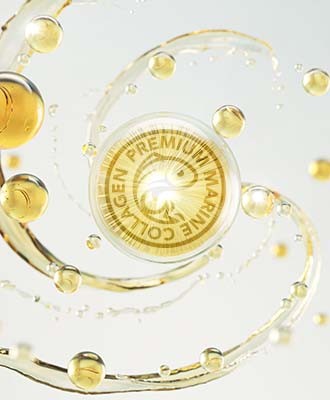Marine Collagen and it’s Benefits for Healthy Living
- By Dr. Khalid M. Shah
- January-24-2024
Dr. Khalid M. Shah
MBBS (Punjab) Ph.D. Ortho (Glasgow)
Cert. Ortho (Singapore) Cert. Arthroscopy (Tokyo)
Dip Biomech (Strathclyde) Cert. Ed. Med. (Glasgow)
Head Department of Orthopedic Surgery
Al-Khaleej Orthostem Clinic, Karachi.
MBBS (Punjab) Ph.D. Ortho (Glasgow)
Cert. Ortho (Singapore) Cert. Arthroscopy (Tokyo)
Dip Biomech (Strathclyde) Cert. Ed. Med. (Glasgow)
Head Department of Orthopedic Surgery
Al-Khaleej Orthostem Clinic, Karachi.
What is Collagen
Collagen is a protein which is responsible for healthy joints and elasticity or stretchiness of skin. It is present in bones, muscles and blood. Collagen forms three quarters of the skin and makes up a third of the body’s protein.Collagen contains the three amino acids glycine, proline and hydroxy proline. It adds structure, strength and resilience to hard and soft tissues of the body. Collagen in human tissue can be likened to the presence of steel rods in the columns of a building, where this steel matrix is then poured with cement.
The steel rods provide bending strength to the columns while the cement mix provides compressive strength. Human tissue such as bones similarly require flexibility provided by collagen and ability to withstand compressive loads which is provided by cells and mineral calcium embedded in the collagen matrix.
How Is Collagen Formed
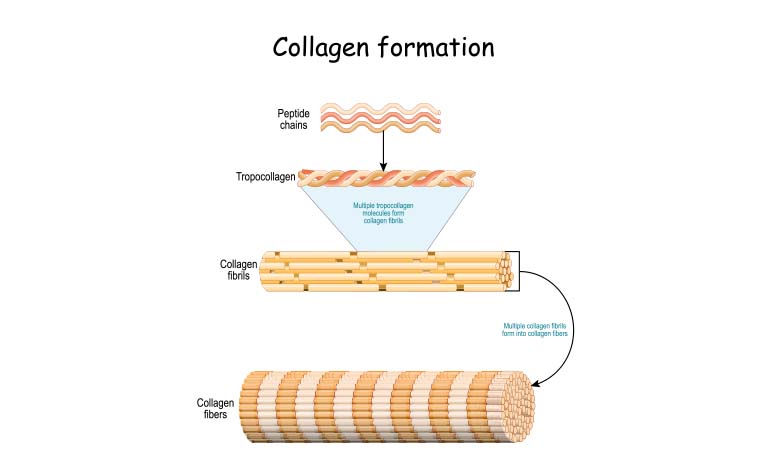
The human body forms its own collagen by a process called collagen synthesis. The production of collagen requires the above-mentioned amino acids. These amino acids come from the protein found in the foods that humans eat. These amino acids bind together into a tough rope like chain to create collagen.
Effect of Aging on Collagen
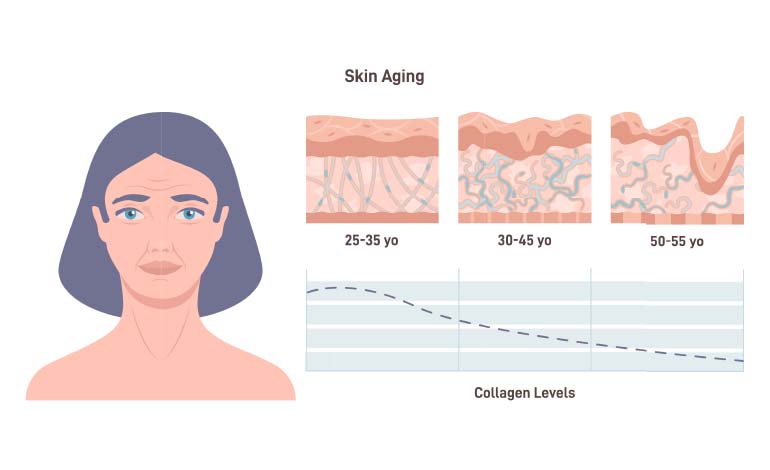
Collagen makes up to 75% of the skin and provides elasticity to it. The body’s ability to synthesize collagen declines as we age. The quality of collagen produced also declines with ageing.
The sun’s UV rays, pollution and smoking also adversely affect the collagen levels in the skin and body. The cumulative effect of ageing leads to lower production of natural collagen leading to wrinkles and facial lines. This process is aggravated due to exposure to sun, smoking and environmental pollution.
Different Types of Collagen
There are 28 types of collagens but 3 of these are more important for skin and joint health. The three main types of collagens are:Type 1, which is the most common, is 90% body collagen and is found in skin, bone, teeth, tendons, ligaments and organs.
Type 2 is mainly found in the cartilage of the joints.
Type 3 is present in skin, muscles and blood vessels.
Collagen Sources
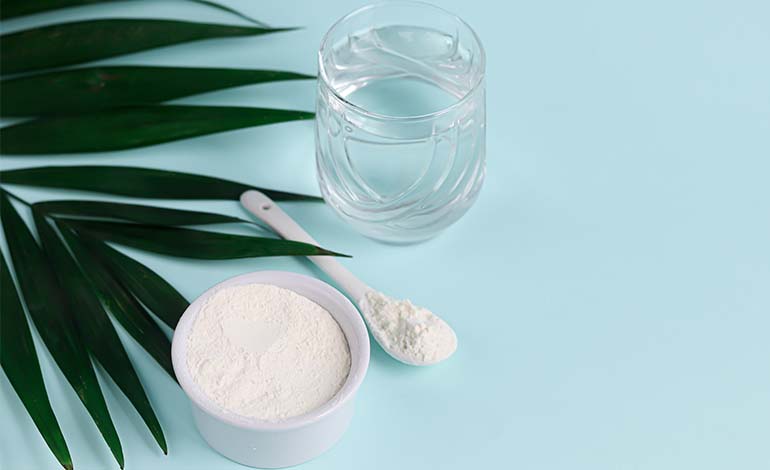
There are many sources of collagen, the two main ones are Marine and Bovine Collagen.
- Marine Collagen is extracted from the bones, skin and scales of fish. This is considered as the most effective type of collagen for skin and joint support. It has both type 1 and type 2 collagen.
- Bovine Collagen comes from cows and is beneficial for skin. It contains type 1 and type 3 collagen.
Collagen Benefits
- Prevents Premature Ageing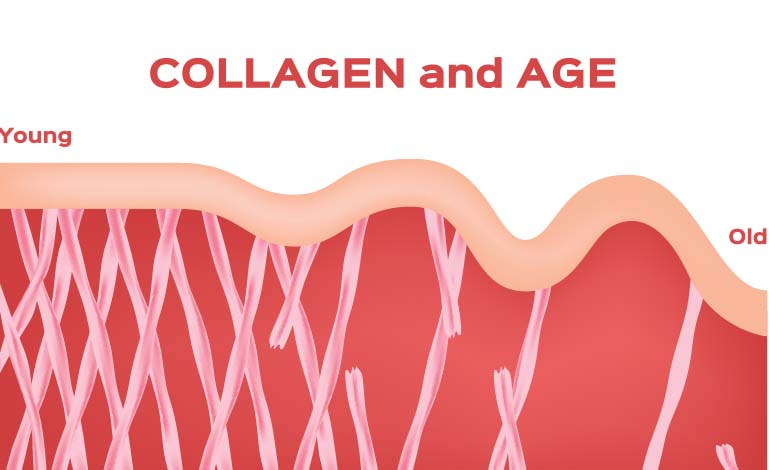
It helps prevent premature ageing of the skin. Taking collagen supplements improves the appearance of skin and reduces hallmarks of ageing. The oral intake of collagen supplements over a period of 8 weeks has shown significant improvement in hydration and collagen density of the skin.
- Maintains joint health
Human joints are protected by tough rubbery cartilage lining the bones. The main function of the cartilage is to prevent the grinding of bones together. The gradual drop in natural collagen levels of the body with ageing. This leads to erosion of the bone cartilage leading to grinding of bones causing joint discomfort, pain, stiffness and decreased flexibility over time. This process is called Osteoarthritis (OA) of joints. Studies have shown that taking oral collagen supplements stimulates the regeneration of collagen tissues which reduces friction between the joint bones thus reducing joint discomfort and pain.
- Helps heal the gut
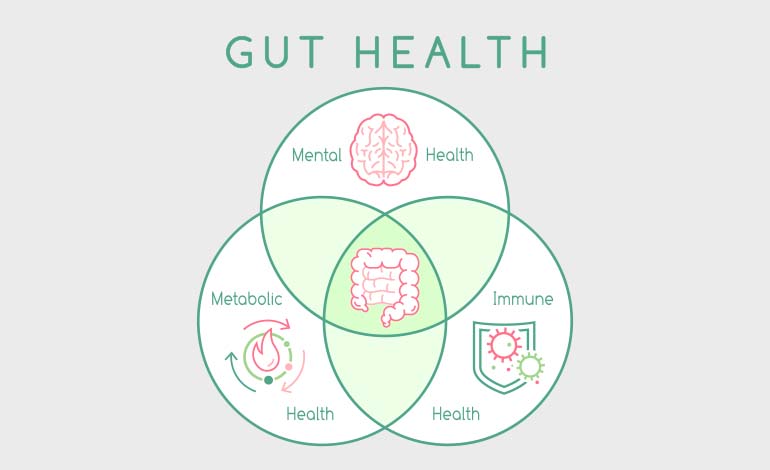
Collagen provides structure to all of the body’s tissues including the lining of the stomach and intestines. It helps repair damaged cells in these areas.
What Happens When Your Body Has Low Collagen Levels?
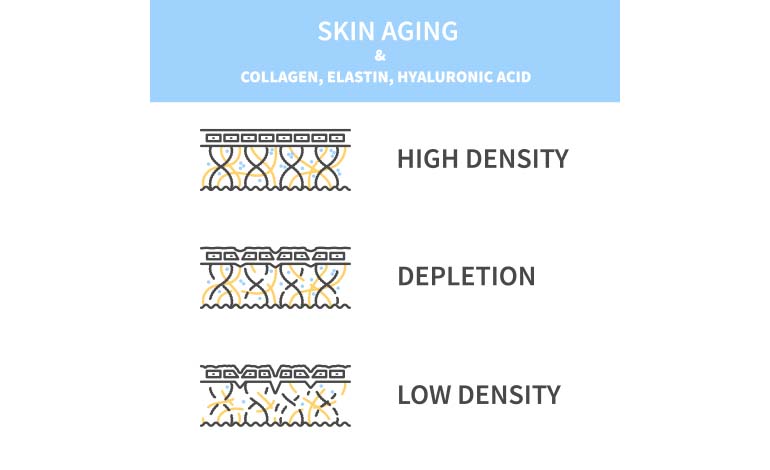
When the body experiences low collagen levels, various detrimental effects manifest across different tissues. Diminished collagen leads to skin sagging, wrinkles, and reduced elasticity. Joint health is compromised, resulting in stiffness and discomfort.
Weakened connective tissues may contribute to increased susceptibility to injuries. Collagen deficiency can also affect hair and nails, causing brittleness and slow growth. As collagen is integral to blood vessel integrity, low levels may impact cardiovascular health.
Incorporating collagen-rich foods or supplements may help mitigate these effects and promote overall well-being by supporting tissue repair and maintenance.
Marine or Bovine Collagen?
Marine collagen has both type 1 and type 2 collagen which are primarily responsible for skin and joint health. Bovine collagen on the other hand contains type 1 and type 3 and lacks type 2 collagen which is needed for joint health. It therefore stands to reason that marine collagen is superior as it benefits both skin and joint health whereas Bovine collagen is good for skin only.Marine collagen is absorbed well by the human body and is considered as being more ecofriendly and sustainable compared to Bovine collagen.
Marine collagen is considered “cleaner” than collagen from land animals as there is a lower risk of contaminants and transmissible disease from a fish source.
Cultural and religious factors also affect the suitability of Bovine (cow derived) or Porcine (pig derived) collagen.
This means Marine collagen is the most consumer-friendly type across the world.
Here Are A Few Common Collagen Misconceptions
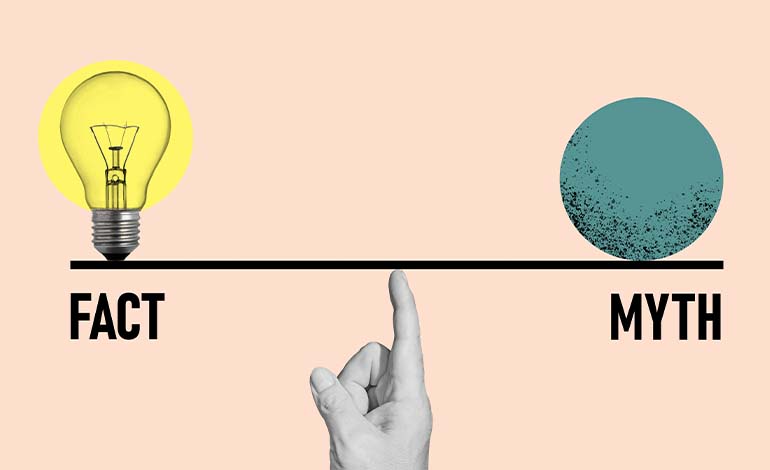
Instant Results
One common misconception is expecting instant results from collagen supplements or skincare products. Collagen takes time to be absorbed and integrated into the body's tissues, so visible changes may not occur immediately.
Wrinkle Elimination
While collagen plays a role in skin elasticity, it cannot entirely eliminate wrinkles. Factors like genetics, sun exposure, and lifestyle also influence skin aging.
Vegetarian or Vegan Sources

Some may assume that collagen supplements can be derived from vegetarian or vegan sources. However, collagen primarily comes from animal tissues, making it challenging to obtain true plant-based collagen.
Targeted Fat Loss
Another misconception is that collagen supplements can specifically target and reduce fat in certain areas of the body. Collagen supports overall skin health but is not a weight loss solution.
Endless Shelf Life
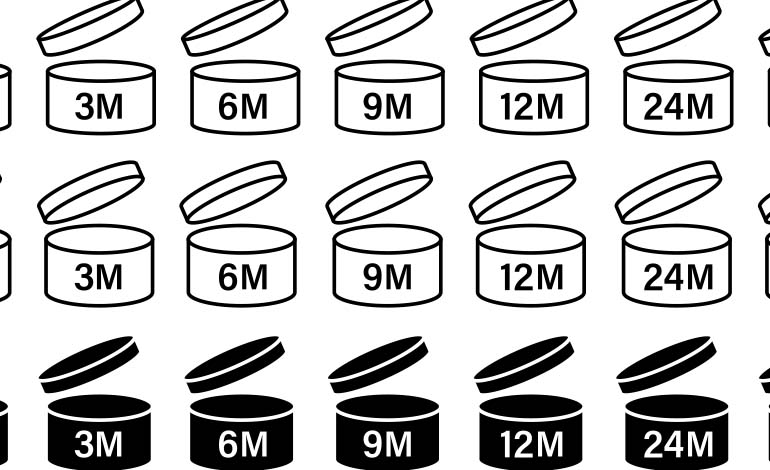
Collagen products, particularly supplements, may not have an indefinite shelf life. Storage conditions, including exposure to heat and humidity, can affect the quality of collagen over time. Checking expiration dates and proper storage is crucial.
FAQs
What is the main function of collagen?
Collagen’s main function is to provide strength, structure, and elasticity to skin, bones, tendons, ligaments, and cartilage. This fibrous protein plays a vital role in maintaining the integrity of our skin, promoting joint flexibility, and supporting overall tissue health. Additionally, collagen contributes to wound healing and ensures the cohesion and stability of different bodily structures.
What is collagen and what does it do?
Collagen is a vital protein found in the body, serving as a structural component in various tissues. Its primary function is to provide strength, structure, and elasticity to tissues such as skin, bones, tendons, ligaments, and cartilage. Collagen contributes to the overall integrity and resilience of the skin, promotes joint flexibility, and supports the health of connective tissues. Additionally, it plays a role in wound healing and helps maintain the cohesion and stability of bodily structures, making it essential for overall tissue health and function. What is collagen good for?
Collagen offers numerous health benefits, making it a valuable component for various aspects of well-being. Some of the key benefits of collagen include:- Skin Health: Collagen promotes skin elasticity, hydration, and firmness, reducing the appearance of wrinkles and fine lines.
- Joint Support: It helps maintain the integrity of cartilage, promoting joint flexibility and reducing discomfort associated with conditions like osteoarthritis.
- Hair and Nail Strength: Collagen contributes to the strength and resilience of hair and nails, promoting their growth and health.
- Bone Health: Collagen provides structure to bones, enhancing bone density and supporting overall skeletal health.
- Gut Health: It helps strengthen the gut lining, aiding in digestion and potentially reducing symptoms of conditions like leaky gut syndrome.
- Wound Healing: Collagen plays a role in the healing of wounds, promoting tissue repair and regeneration.
- Muscle Mass: It supports the structure of muscles, contributing to muscle strength and function.
- Heart Health: Collagen may help maintain the elasticity of blood vessels, promoting cardiovascular health.
What is collagen powder?
Collagen powder is a supplement derived from animal connective tissues, typically skin, bones, and cartilage. It is a hydrolyzed form of collagen, meaning it has undergone a process that breaks it down into smaller, more easily absorbed particles.Yonboon unflavored marine collagen powder is known for its high protein content and is often flavorless and odorless, making it versatile for mixing into various foods and beverages. People often use collagen powder to support skin health, joint function, and overall well-being. It comes in different types, such as bovine (from cows), porcine (from pigs), or marine (from fish), catering to various dietary preferences.
What is collagen protein?
Collagen protein is a type of protein that is a key structural component in the connective tissues of the body. It is abundantly found in the skin, bones, tendons, ligaments, and cartilage. Collagen provides strength, structure, and elasticity to these tissues, contributing to their overall integrity.Collagen protein is unique due to its amino acid composition, rich in glycine, proline, hydroxyproline, and arginine. These amino acids play a crucial role in collagen's ability to support skin health, joint function, and various bodily structures.
Collagen protein is available in various forms, including dietary supplements like collagen powders, capsules, and as an ingredient in certain foods and skincare products. Consuming collagen protein is believed to promote overall well-being by supporting the health of connective tissues throughout the body.
What are collagen supplements?
Collagen supplements are dietary products designed to increase the intake of collagen, a crucial protein in the body. These supplements often come in various forms, including powders, capsules, tablets, and liquid formulations. Collagen supplements are typically derived from animal sources such as cows, pigs, or fish, and they may contain specific types of collagen like Type I, II, or III.People use collagen supplements to support skin health, promote joint function, strengthen hair and nails, and contribute to overall well-being. The supplements are often hydrolyzed, meaning the collagen is broken down into smaller, more easily absorbed particles. While research on the effectiveness of collagen supplements is ongoing, many individuals incorporate them into their wellness routines to address specific health and beauty goals.
What is collagen drink?
A collagen drink is a beverage that contains collagen as one of its primary ingredients. Typically marketed as a beauty or health drink, it is formulated to provide the body with additional collagen, a protein important for skin, hair, and joint health. Collagen drinks often come in liquid form and may contain hydrolyzed collagen such as Yonboon The Shot, which is broken down into smaller, more easily absorbed particles.These drinks may also include other ingredients such as vitamins, minerals, antioxidants, or flavorings to enhance their taste and nutritional profile. The goal of consuming a collagen drink is to support the body's natural collagen production, potentially benefiting skin elasticity, reducing wrinkles, and promoting overall well-being. However, it's important to note that individual responses to collagen supplementation can vary, and scientific evidence supporting some of these claims is still evolving.
Future of Collagen
Scientists are investigating advanced methods for collagen extraction, including plant-based and lab-grown alternatives, catering to diverse dietary preferences. Innovative formulations and delivery systems may enhance collagen absorption, offering more effective results.With an increasing focus on personalized nutrition and holistic well-being, collagen's role in promoting skin health, joint function, and overall vitality is likely to evolve, contributing to a dynamic landscape of collagen-based products and advancements.
Summary
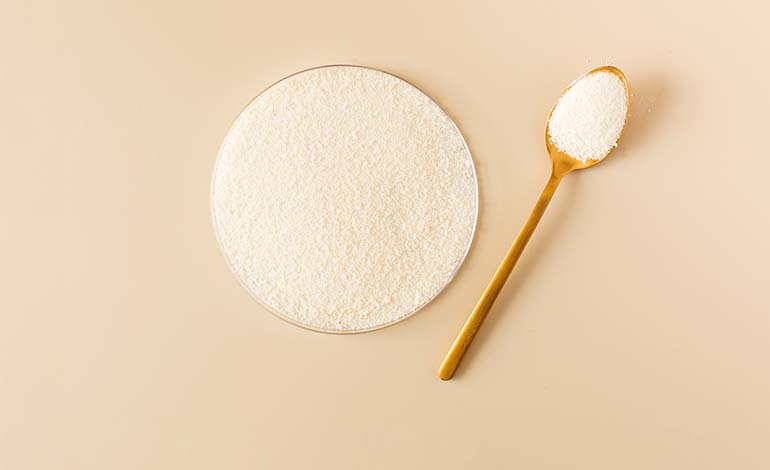
Collagen is a protein formed by the human body using amino acids from the protein ingested during meals. Collagen is abundantly present in skin and joint tissue. Collagen is degraded with ageing and its production and quality is affected, resulting in wrinkles of the skin and degenerative arthritis of joints. Studies have shown that taking supplemental marine collagen can improve the effects of ageing of skin and cartilage of the joints.
